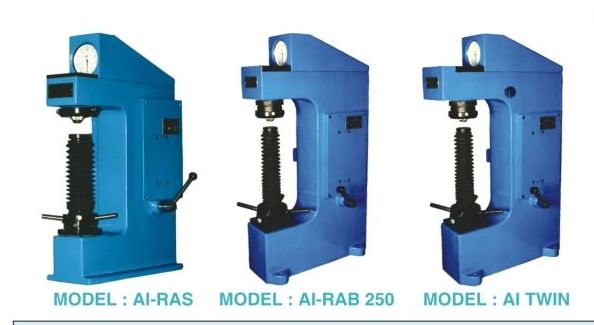sales@adityainstruments.co.in - GST NO. : 27AFOPC9275N1ZN
The Rockwell Hardness Test Explained Simply
Posted by Admin on April, 26, 2024

It is a set-up idea in manufacturing that a specific object is just as great as the materials it is made of. As such, production pros must guarantee that each component, material, and material treatment utilized to construct a specific gadget or machine will be solid.
This is often where the Rockwell Hardness test comes into play. This is because it was particularly outlined to the degree of a material's solidness. The system is outlined for testing to understand the ASTM E18 standard.
Why is the Rockwell Strategy Reliable?
In a few cases, gaging the quality of materials through Rockwell Hardness Tester is best. Typically, this is due to a few preferences, as recorded below.
1. No Material Planning is Required
In some tests, the test material must be buffed, ground, cut up, and cleaned to urge the foremost precise readings. Tests like the Knoop and Vickers method require the test surface to be as level as conceivable with little to no variety.
Within the Rockwell strategy, since the indentation depth is measured, the test does not experience diverse forms to form the exact test. Also, why is the Rockwell strategy utilised when testing unrefined materials like metal?
2. No Optical Assessment
The hardness esteem is straightforwardly discernible with the Rockwell strategy since most hardness testers do not utilize corner-to-corner scales to degree hardness. This can be very genuine if you take a computerized Rockwell Hardness tester, as the values are instantly shown on screen after a number of seconds of preparation.
With the nonappearance of optical assessment, the chances of the operator making a mistake on the readings are altogether decreased.
3. Cost-Effective
Since Rockwell hardness testers don't have to be prepared with expound optical assessment systems, they have moderately brief test cycles. This permits a more effective testing preparation, as operators can rapidly move from one example to another.
In expanding to the reality that Rockwell testers are significantly cheaper than other disobedient, the Rockwell strategy makes for a generally cost-effective process. This is usually not the only way the Rockwell strategy makes a difference; its operators spare on costs.
4. Non-Destructive
Although the test leaves a sizeable indent on the material, the Rockwell strategy is non-destructurally invasive. After each test, the example can still be utilized for other purposes.
The Rockwell strategy can viably assist its operators in diminishing their waste. If your workshop too forms raw materials, this might offer assistance in reducing operational costs.
What Are The Limitations Of The Rockwell Testing Systems?
The Rockwell Testing systems depend on the material being tried, counting its hardness, thickness, indentation situating, and scale limitations. When made of the material, the material being tried must be at the slightest ten times thicker than the Rockwell indentation.
In Conclusion
Despite its preferences, the Rockwell strategy isn't accurately pertinent in all occurrences. In any case, it is not mean that a Digital Rockwell Hardness Testing Machine will not yield impressively precise estimations, which ought to assist any workshop.
Typically, you must find a trustworthy producer who can provide you with a well-built Rockwell tester. On the off chance that they are calibrated correctly, these disobedient can assist you in improving the quality of your facility's yield while diminishing waste.
Search
Category
Recent Posts
- How Metal Safety Depends on a Vickers Hardness Testing Machine
- Electronic Universal Testing Machine - Product, Benefit & Feature
- What to Expect from a Good Torsion Testing Machine Exporter
- How Rockness Hardwell Testing Machine Ensures Material Quality and Strength?
- Brinell hardness testing machine: An effective means of assessing material hardness

Leave a Comment